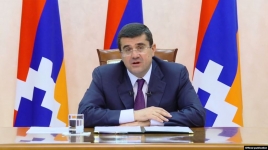“The likelihood of resolving this problem within decades is very low,” Harutiunian told a news conference in Stepanakert. “We don’t see that happening.”
“That is why through strengthening our army we should force the enemy to reckon with the Armenian force of Artsakh (Karabakh) and maintain the status quo until major geopolitical developments that could lead to some temporary or rather partial resolution of the Karabakh conflict,” he said. “A full resolution is not possible.”
The Karabakh leader said that the international community has already brokered such an interim solution to the conflict in Kosovo, an Albanian-populated former province of Serbia recognized as an independent state by most Western nations.
Harutiunian spoke to reporters on the 19th anniversary of Karabakh’s declaration of independence from Soviet Azerbaijan which came just four months before the breakup of the Soviet Union and was followed by a bloody Armenian-Azerbaijani war for the territory.
Azerbaijan never recognized the legality of that declaration. It continues to consider Karabakh an internationally recognized part of Azerbaijan occupied by Armenia.
Harutiunian’s remarks came amid efforts by international mediators -- and Russia in particular -- to revive the Karabakh peace process following the recent heavy fighting at a volatile section of the border between Armenia and Azerbaijan.
Russian Foreign Minister Sergei Lavrov said on Tuesday that both Yerevan and Baku now seem interested in further easing tensions and resuming peace talks mediated by the U.S., Russian and French co-chairs of the OSCE Minsk Group. He stressed that the talks should continue to focus on a framework peace accord which was first put forward by the mediators in 2007 and has been repeatedly modified since then.
The mediators’ so-called Madrid Principles call for a phased settlement that would start with Armenian withdrawal from virtually all seven districts in Azerbaijan proper fully or partly controlled by Karabakh Armenian forces. In return, Karabakh’s predominantly Armenian population would be able to determine the dispute region’s internationally recognized status in a future referendum.






